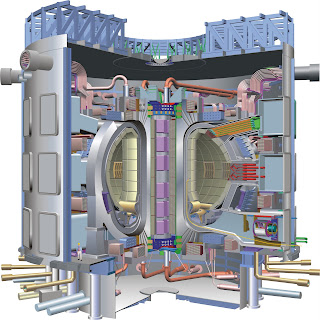
Robert
Zubrin is one of the strongest advocates of space colonization living today. He has written two excellent books about our future space-faring selves:
The Case for Mars (1997) and
Entering Space (2000).
Normally,
Zubrin could be folded under the Libertarian umbrella and he is a strong advocate of private space ventures but, as he rightly points out, colonizing space is expensive and the motivations of private corporations to go out there are not so strong. Launching sub-orbital tourist trips or even low earth orbit tourist travel requires radically different technologies from those that would take us to Mars or the Moon. He also points out that rocket technology hasn't changed that greatly from the time of
von Braun. The much heralded space shuttle was a sinkhole for tax-payers money and was still a 3 stage vehicle. Maybe the new
Orion space capsule is a step in the right direction...only time will tell.
I believe one of the most limiting factor has been to depend on handful of contractors to deliver space travel and as
Zubrin pointed out using cost plus contracts (wherein
Nasa agrees to pay for all the costs plus a percentage of the costs as payment) with the likes of Lockheed Martin and Boeing.
What has worked very well in the past and will probably still work - and is a very good use of tax payer's money is to offer prizes.
The
Ansari-X Prize was a private prize for the first space craft to go suborbital twice in 2 weeks.
Similarly Northrup Grumman has a
lunar lander prize:
The Competition is divided into two levels. Level 1 requires a rocket to take off from a designated launch area, rocket up to 150 feet (50 meters) altitude, then hover for 90 seconds while landing precisely on a landing pad 100 meters away. The flight must then be repeated in reverse—and both flights, along with all of the necessary preparation for each, must take place within a two and a half hour period.
The more difficult course, Level 2, requires the rocket to hover for twice as long before landing precisely on a simulated lunar surface, packed with craters and boulders to mimic actual lunar terrain. The hover times are calculated so that the Level 2 mission closely simulates the power needed to perform the real lunar mission.
This is all well and good. But I think the real bang would come if the government would start offering prizes to the tune of $10 Billion for sending a manned spacecraft to land on Mars - or have a graduated approach wherein the government offers a prize for the first private unmanned mission to orbit Mars, the first private unmanned mission to land on Mars, the first manned mission to orbit Mars and the first manned mission to land on Mars (although if you're going to make the effort to get to Mars then you may as well stay there for a few months).
The advantage is that taxpayers get all the benefits without all the overhead of a typical government project such as overpaid contractors, scope creep and
$100 pencils (sorry the $1 million pen is an urban myth).
Added benefits include, introducing real competition into the game, increasing the number of engineers - and therefore ideas - 10 fold (through all the private companies willing to take part), reducing
bureaucracy and increasing the level of risk taking beyond what most government agencies are willing to stomach (witness the near shut-down of the shuttle program after the Challenger and Columbia accidents). Of course, senators and congressmen won't be able to inject the usual pork into the project because the rules would be clear and unambiguous about what constitutes winning.
There are some economic advantages. The present value of $10Billion discounted over 10 years by 10% is about $3.9B (assuming it takes 10 years to develop a spacecraft). Remember, this is money that doesn't have to be paid until someone delivers. The senator or congressman who suggests this would reap all the benefits of landing on Mars without having the associated costs. This is what I would call a win-win situation.
It would be a humbling of
Nasa but on the other hand, we have a realistic chance of then getting to Mars and staying there.
Incidentally for those of you interested in the colonization of Mars here's a couple of websites:
The Mars Society (Robert Zubrin was one of the founders)Red Colony






